- Joined
- Nov 19, 2007
- Messages
- 18
Hi everyone!!
I have started doing some enrichment with the Maori Octopus here at Melbourne Aquarium in Australia and I have some pretty cool pics and videos that I thought you might be interested in.
The first one I tried was a colourful parrot toy I got off ebay and stuffed with squid (leaving some squid tentacles hanging out of the ball). He took the ball along his tentacles to his mouth, then he enveloped with his arms just like in this video....
After that he sat on the rock with the ball under his mouth, you can see it in the photo as a very cute bulge! He got the squid out, but didn't eat it.
Suze
I have started doing some enrichment with the Maori Octopus here at Melbourne Aquarium in Australia and I have some pretty cool pics and videos that I thought you might be interested in.
The first one I tried was a colourful parrot toy I got off ebay and stuffed with squid (leaving some squid tentacles hanging out of the ball). He took the ball along his tentacles to his mouth, then he enveloped with his arms just like in this video....
After that he sat on the rock with the ball under his mouth, you can see it in the photo as a very cute bulge! He got the squid out, but didn't eat it.
Suze

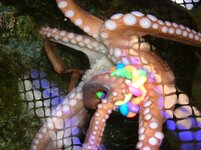
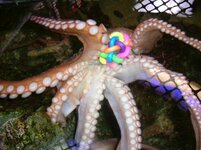
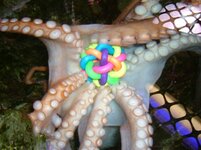
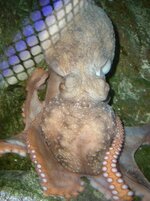
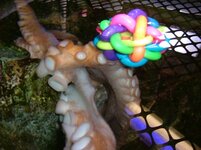
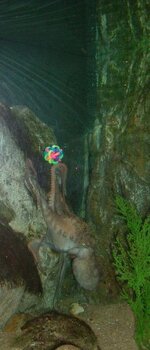
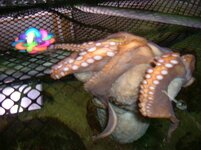
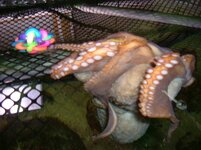
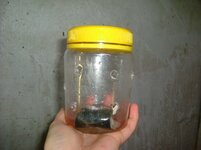
 But next time I will try and ease him into it gently, and am going to give him the jar without a lid a few times, and then place the lid on without screwing it, and then gradually screw the lid tighter...
But next time I will try and ease him into it gently, and am going to give him the jar without a lid a few times, and then place the lid on without screwing it, and then gradually screw the lid tighter...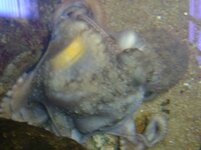
 ) as Pinnoctopus cordiformis in 1999 (I think!). They look REALLY similar but you would never get ours eating dead food, we have tried so many times (it would be a great advantage in winter when we can't get the boats out!) so we must supply live food. They're also not terrifically interested in toys, although I must confess we don't try too hard with artificial toys (Boss is very much into having the display as natural as possible!) we use live food, rocks, weed, and of course the occasional (occasionally, every day
) as Pinnoctopus cordiformis in 1999 (I think!). They look REALLY similar but you would never get ours eating dead food, we have tried so many times (it would be a great advantage in winter when we can't get the boats out!) so we must supply live food. They're also not terrifically interested in toys, although I must confess we don't try too hard with artificial toys (Boss is very much into having the display as natural as possible!) we use live food, rocks, weed, and of course the occasional (occasionally, every day